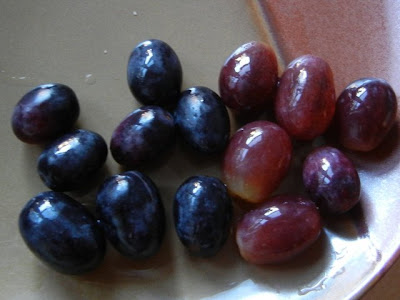
Pictured on the left are black grapes, and on the right, red grapes. These grapes were grown in California, and are currently in season, so are inexpensive and tend to be relatively high in quality. While I prefer buying local produce, I definitely prefer buying California grapes, while in-season, to produced shipped from outside the country.
I typically eat some fruit with my breakfast, and I've had a lot of these grapes on hand recently, so I've been munching on them as I drink my morning cup of tea. In the course of eating these grapes together with different teas, I've realized something about tea-grape pairings. This is not the first time I've explored tea-fruit pairings; see Pare down the teas to pair with your pear for a similar post based on a terrible play on words, or Grapefruit and tea for my discovery that one of my favorite breakfast fruits often spoils the flavors of many types of tea.
Grapes and tea:
Certain types of tea have a natural grape-like quality. Both Darjeeling black teas and Bai Hao Oolong often have a quality said to resemble muscat grapes, a specific type of grape. Of the two grapes pictured above, muscat grapes are probably more similar to the black grapes on the left...which brings us into the realizations of pairing.
The red grapes above, I found to be relatively neutral among fruits. They were crisp, lightly sweet, lightly sour, and somewhat watery, making them refreshing without really dominating the palate. These grapes seemed to go well with just about any teas I drank for breakfast, black, green, oolong, Pu-erh, or white. They did not get in the way of my appreciation of the tea, nor did they enhance it.
Black grapes:
The black grapes however, were another beast. These were a bit stranger, not the usual grapes you buy at the supermarket. They had a dusty outside, and their skin was noticeably astringent. The interior was intensely sweet, but less sour than the familiar red or green grapes, and they had a strong, deep aroma, reminiscent more of raisins than of most fresh grapes.
I tried these grapes with a variety of teas and I found that they tended to overpower most teas, including lighter black teas, green teas, and white teas. However, the mornings that I drank strong Assam (lately I've been drinking a lot of Ahmad Tea's Kalami Assam), I found that these grapes not only went well with the tea, but helped me to enjoy the tea in a more intense and deeper way than I normally did. It was hard to notice which qualities were from the grapes and which from the tea, as both left lingering flavors on the palate, but I found that sipping the tea after munching on these grapes led to an explosion of a deep, fruity aroma, like in some of the better Keemun I've tried--qualities sometimes present in Assam, but not to this degree.
How about you?
Have you ever tried grapes like the ones described here? Do you like eating grapes with tea? Which teas and grapes do you think go well together?
Thank you for the post I"m always interested in tea and food pairings.
ReplyDeleteI got a gift from a friend which is labeled Yuzu Oolong it has the scent of grapefruit and a slight flavor of the fruit also. I found it to be a lovely brew. Are you familiar with this one?
Nicole of Tea for Me Please reviewed this tea some time ago, and I remember reading about it.
ReplyDeleteIt's intriguing, especially given how I've found grapefruit does not go well with many teas. I have yet to try anything from NaiveTea, but from what I've read, they really excel at flavored oolongs, a strange and difficult niche but one that has the potential to be very fulfilling--one of my favorite teas is an Osmanthus-scented oolong from Upton Tea.
In your post about Pears and Tea I think you brought up an important point. Contrasting the flavor of the tea with the item being eaten is often beneficial. I am not a big fan of the Thompson seedless grapes (sultanas), but when I have them with a nice cup of Lapsang Souchong all is well in the world! I had some nice Silver Needle with Osmanthus tea that seemed to go well with Ruby red grapes and champagne grapes, which I think has to do with the slightly sharp bight of the Osmanthus flowers.
ReplyDelete